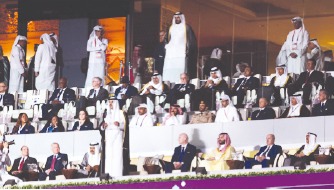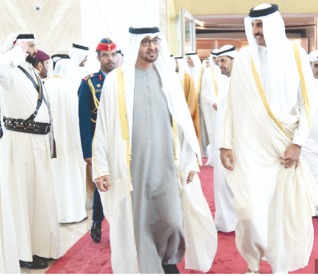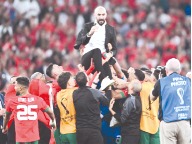By Naser Alrashdi
I strongly believe that when people from all over the globe gather, co-operate and/or honourably compete towards one goal, bright things will come out.
The FIFA World Cup 2022 in Qatar was indeed a remarkably successful global event by all measures. This is not a personal view, but rather a conclusion based on facts and statistics. It is also expressed by many analysts and experts in football, event organisation, technology, media, and even diplomacy and politics. There are many best practices and innovative ideas that have resulted the event’s bright outcomes and achievements, which should be grasped and taught from this event.
In this article, I would like to highlight the role of leadership in making this event a historic achievement with impacts that will still make themselves felt locally, regionally and globally. Such impacts include reassuring and fostering regional reconciliation and collaboration, fostering hope, especially for the developing world, bridging cultures, and using groundbreaking technologies.
I intend via this short article to highlight in brief some examples of such inspiring acts of leadership and success stories.

Government of Qatar Act of Leadership had strong determination and confidence to host the FIFA World Cup 2022. Despite the doubts and criticisms by some, and the very short time for preparation for such global event, media noise, the delays, uncertainties and challenges due to the Covid-19 pandemic, the World Cup 2022 was one of the most successful events in the history of FIFA and the third highest in terms of number of participants. More than 3.1 million people watched its matches. FIFA experts and event organisers confirm its astonishing success. The event was also a reassurance to the world that the pandemic has indeed ended, and that the World Cup 2022 was a global celebration of the full return to normal life after almost three years of coronavirus restrictions and concerns. The State of Qatar has proven to the world that with leadership that has determination and strong confidence in its capabilities and people, nothing is impossible and all such challenges can be eliminated. Qatar has demonstrated that all doubts and media noise can be proven wrong.

Governments of UAE and KSA Act of Leadership reassure regional collaboration, stability and accomplishment. It was truly inspiring to see the act of leadership by the UAE and KSA governments specifically, and the GCC and Arab States generally, in providing full regional support to ensure and maximise the success of World Cup 2022 in hosting, promotion and organisation. The opening ceremony of the World Cup was attended by Saudi Crown Prince Mohammed bin Salman and Egyptian President Abdel Fattah El Sisi, as well as Dubai ruler Sheikh Mohammed bin Rashid Al Maktoum. Then later during the second week of the tournament, on December 25, the UAE President made his first visit since he became president to Qatar to explore areas of mutual interest and opportunities to strengthen the brotherly relations and bilateral ties between the two nations.

Government of KSA Act of Leadership was higlighted in the people’s joy in winning. Saudis and all Arabs were extremely happy and proud of the Saudi football team after their remarkable performance and winning against Argentinia, which that eventually won this tournament. However, what was truly inspiring is to see the immediate act of empathy by the Saudi government leadership with the joy and excitement of its people and giving government employees the following day off, so that they could further enjoy and celebrate the win. This act reaffirms the strong empathy and social response between the government and its people.

Morocco Act of Leadership is shown in long-term vision, determination and confidence in developing a globally competitive team and coach. Moroccans, Arab and African people were so astonished and proud of the great performance of the Moroccan football team during the 2022 World Cup and the beating of previous world cup gaints Belgium, Spain and Portugal and potentially ranking fourth in this 2022 World Cup. However the reason for such a great performance is truly visionary leadership decision by the Moroccan government by investing in the establishment of a state-of-the-art football academy in 2009 with the highest level of training and facilities standards for football as endorsed by FIFA. The academy focused in attracting talented youth and building competitive Moroccan players who became world-class. The academy has also graduated several players for local and foreign football teams. One of its graduates was Yousef Elnessiri, who scored the winning goal against Portugal. Another leadership decision by the Moroccan government was the trust in local capacity and the choice of a Moroccan as head coach for the Moroccan side in late August 2022 – three months before the World Cup in Qatar. The Moroccan government and management of the national team took the risk in order to boost national team spirit. The Moroccan trainer led the local club team to win African Football League championship.

Messi’s act of leadership was represented in his endless loyalty to and determination for his national team to re-gaining the FIFA world cup title after 45 years. Many people around the globe wanted Argentina to win the 2022 World Cup because of their inspiration of the true team leader Lionel Messi. I expect Messi’s football story to be in a movie anytime soon. This long inspiring journey started with his love for and extraordinary talent in football as a boy. At age of 13 he was head-hunted by Barcelona Club and became a member of its youth team. At 18 he was team champion and eventually became captain, taking the club to the heights of global fame and winning of more than 30 regional and global tournaments. This champion never forgot his origins and his national team of Argentina. Nor did he forget his dream to regain the title they had lost in 1978: FIFA World-Cup winner. He chose to represent Argentina national team rather than Spain. Despite the super high demand by his club, he continued to play and train with his national team from 2005. He led the national team to the FIFA World Cup quarter finals in 2006 and 2010, and the semi-final in 2014. The last few years, however, were quite stressful for him, starting with the poor performance of the Argentina national team in the 2018 World Cup and legal battles over tax payments. The big surprise came when Barcelona Club let him go after 20 years of extraordinary achievements. His below-par performance with Paris Saint Germain in the last tournament did not affect his confidence or weaken his determination for Argentina to win the 2022 World Cup. Not only that, in the first game against the national team of Saudi Arabia, Argentina under Messi’s captaincy lost the match, and he was fiercely criticised. Many doubted him and the Argentinian team’s chance to make it to the 16th round this year. This only made Messi more determined culminating in winning the final against France and re-gaining the title after 45 years.

Qatar and FIFA Act of Leadership pioneer and use new technologies and applications. The World Cup 2022 was true demonstration of leadership in pioneering and promoting wide and effective utilisation of technology and new applications to support various aspects and activities of the event. The event brought FIFA Vision 2023 to life with its innovative technologies. More than 16 of the latest technology applications powered World Cup 2022. Technologies such as AI, Data Analytics, Digital Twin, Fast Object Detection, Face Recognition, Computer Vision, Virtual Reality, Gaming, Social Network and Multimedia Digital Platforms were used in powering and enhancing the world organisation, match ruling and officiating, match data and analytics, safety and security, media and broadcasting, and boosting public experience and engagement in football events specifically, and sport events in general. Some of these technologies are indeed breakthrough to be utilised in FIFA events and will change the future in organisation and ruling of football matches and sport events in general. Moreover, the spell of these technologies applications and effects can of course be expanded to other fields and contexts.
Leadership Act of Omani Commentator K. Alblooshi publically and globally admitted to error and apologised live about it. It was notable to watch the commentator Khalil Alblooshi recognise, admit, and apologise for his mistake in not choosing the right words for the UAE during a previous football event in 2019. He made public apology to the UAE during his live commentary for the Quarter-Final between Morocco and France. He explained that he had chosen this particular occasion because he was sure that his apology would reach millions of his audience, football fans, and the rest of the world. This act was highly welcomed and admired by many fans and key regional and UAE social media influencers.
In conclusion, World Cup 2022 was truly a world-cup of leadership. I have highlighted only very few examples. I believe these leadership acts and their circumstances, rationale and resulting impacts can be compiled for a new book or documentary.
Naser Alrashdi is the Director of Legistations, Policies Sector at UAE Space Agency, Lecturer at Mohammed Bin Rashid School of Government






Discussion about this post